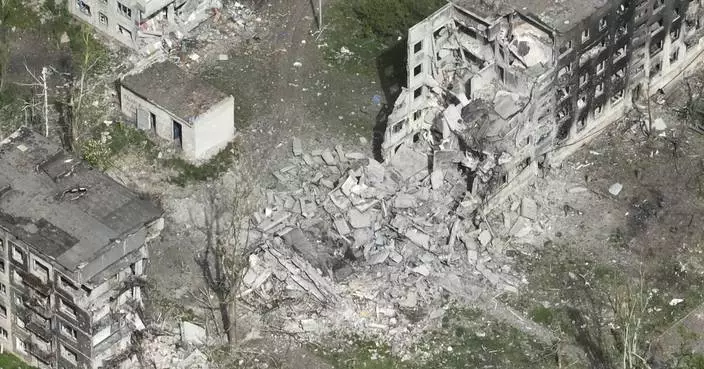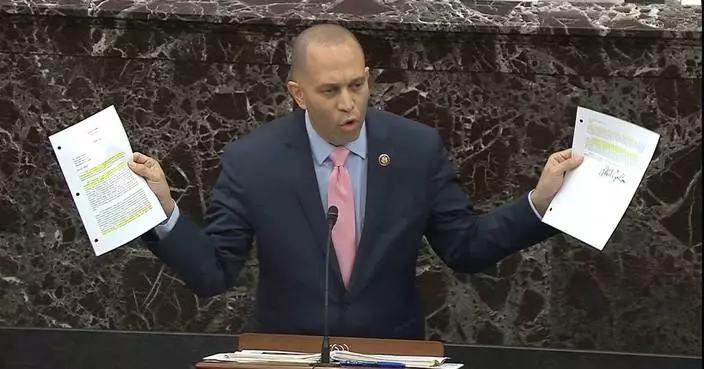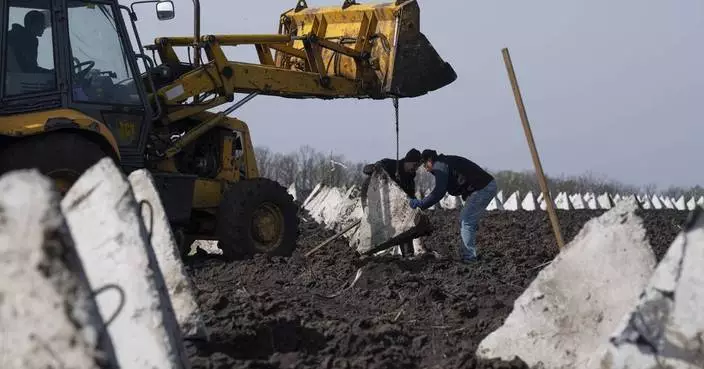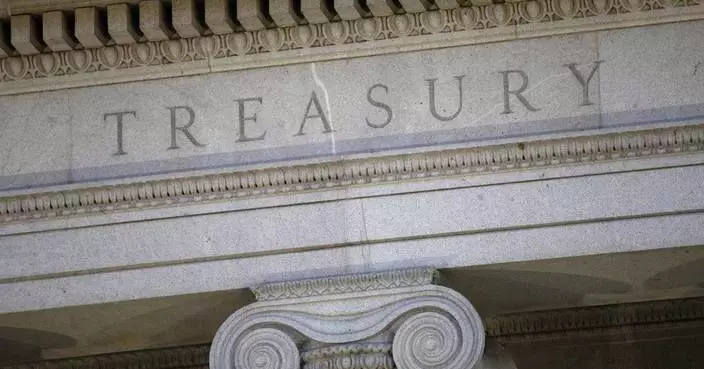FIFA's anti-discrimination advisers are warning gay soccer fans going to the 2018 World Cup in Russia that displays of affection could be met with an aggressive response from intolerant locals.
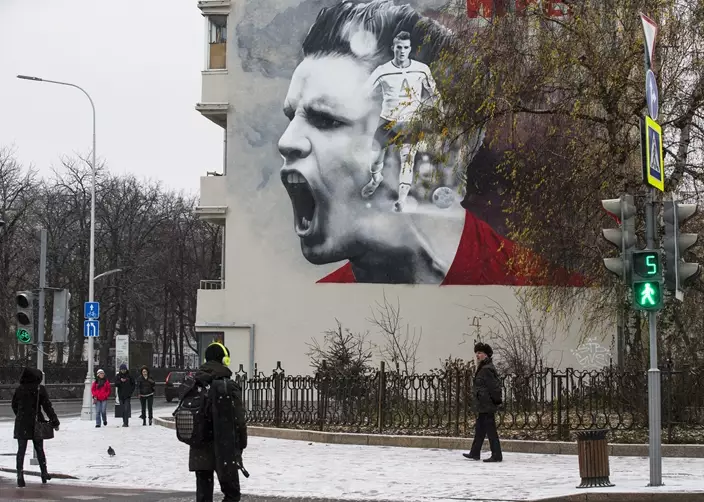
People walk past a huge poster promoting the upcoming soccer World Cup 2018 tournament in Moscow, Russia, Tuesday, Nov. 28, 2017. The World Cup will be played at 12 stadiums in 11 Russian cities. (AP Photo/Alexander Zemlianichenko)
Homosexuality was decriminalized in Russia in 1993, but anti-gay sentiment remains strong and intensified after a law was introduced in 2013 prohibiting dissemination to minors of "propaganda" legitimizing homosexuality.
As fans prepare their trips after Friday's World Cup draw, the FARE network said it will produce a guide spelling out the threats to be prepared for in Russia.
"The guide will advise gay people to be cautious in any place which is not seen to be welcoming to the LGBT community," FARE executive director Piara Powar said. "If you have gay fans walking down the street holding hands, will they face danger in doing so? That depends on which city they are in and the time of day.
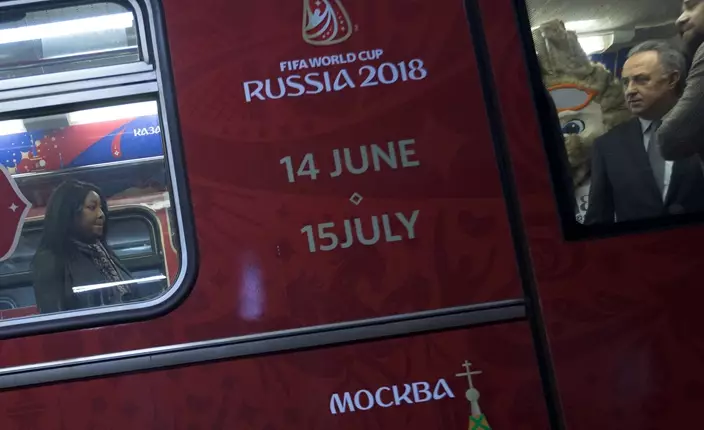
Fatma Samoura, FIFA Secretary General, left, and Vitaly Mutko, Russian Federation Deputy Prime Minister & Local Organising Committee Chairman walk inside a metro train branded for the 2018 World Cup during a ceremony in Moscow, Russia, on Tuesday, Nov. 28, 2017. (AP Photo/Ivan Sekretarev)
"The guide will also include some detailed explanations of for example the actual situation of the LGBT community in Russia. It is not a crime to be gay but there is a law against the promotion of homosexuality to minors. Issues relating to the LGBT community are not part of the public discourse. Gay people have a place in Russia which is quite hidden and underground."
FARE, which monitors FIFA fixtures for discriminatory behavior, said it is unclear whether fans will be allowed to display rainbow flags inside stadiums.
"British and German fans' groups have asked FIFA if they are OK to raise a rainbow flag inside the stadium," Powar said. "FIFA has not really responded so far to say if this is something the security services will allow."
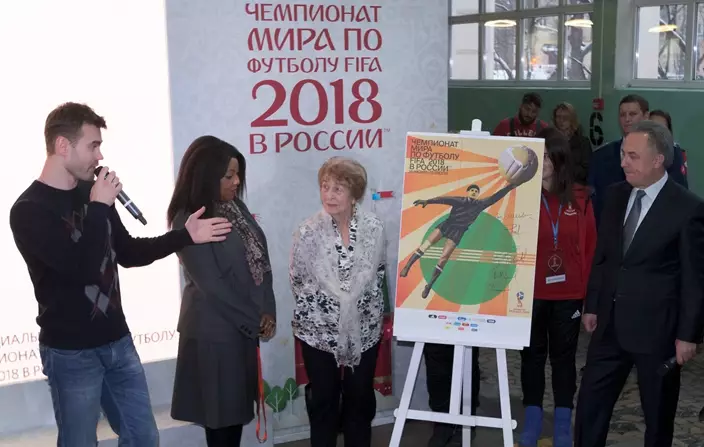
From left, Igor Akinfeev, Russian national soccer team goalkeeper, Fatma Samoura, FIFA Secretary General, Valentina Yashina, widow of famous Soviet goalkeeper Lev Yashin and Vitaly Mutko, Russian Federation Deputy Prime Minister & Local Organising Committee Chairman attend the unveiling of the 2018 World Cup official poster in Moscow, Russia, on Tuesday, Nov. 28, 2017. (AP Photo/Ivan Sekretarev)
FIFA diversity head Federico Addiechi said he has seen no written request from fan groups on whether gay pride flags can be unfurled.
"There's nothing in the regulation from FIFA that prevents anyone from entering the stadiums with non-political messages," Addiechi said.
FARE has also has long-standing concerns about the reception black and ethnic minority fans will face around games in Russia.
"Do go to the World Cup, but be cautious," Powar said. "There are two elements to it — one towards people of color and other element is far-right nationalism. Far-right extremist groups have had around 300 people banned from attending the World Cup.
"After years of denial about racism Russian FA finally taking action, group under Alexei Smertin has been addressing the issue and fines have been issued."
Research for the 2016-17 by FARE and Russia-based SOVA showed there were 89 racist and far-right incidents at Russian games, slightly below the two previous seasons.
Russian champion Spartak Moscow was punished by UEFA for monkey chants in a recent Youth League game against Liverpool. Spartak was also fined for discriminatory chants against fans from Russia's North Caucasus in a domestic cup game last month.
Anti-discrimination observers will be deployed at the June 14-July 15 World Cup where matches can be stopped or abandoned if racism persists after warnings inside stadiums.
"The World Cup must be inclusive, respect human rights, must respect the rights of everyone including minorities," Addiechi said. "We have the assurance from the Russian organizing committee and the Russian authorities that everyone will feel safe, comfortable and welcome in the country."
KYIV, Ukraine (AP) — The situation on the front line in eastern Ukraine is worsening but local defenders are so far holding firm against a concerted push by Russia’s bigger and better-equipped forces, a senior Ukrainian military official said Thursday.
Russia has amassed troops in the Donetsk region in an effort to punch through the Ukrainian defensive line, according to Nazar Voloshyn, spokesperson for Ukrainian strategic command in the east of the country.
“The enemy is trying to seize the strategic initiative and breach our defense,” Voloshyn said on national television.
“The enemy is actively attacking along the entire front line, and in several directions they have achieved certain tactical advances,” he said. “The situation is changing dynamically.”
Russia has pushed Ukraine onto the back foot on the battlefield as Kyiv grapples with shortages of troops and ammunition. Ukrainian forces are now racing to build more defensive fortifications at places along the around 1,000-kilometer (600-mile) front line.
Ukraine’s difficulties have been deepening for months as the military waited for vital new military aid from the United States. The support was held up in Washington for six months.
Ukrainian soldiers withdrew from Avdiivka, a city in the Donetsk region, in February under a withering Russian barrage that had sapped their fighting strength and morale. Since then, the Kremlin's forces have used their military might to take village after village in the area, bludgeoning them into submission, as they look to capture the parts of Donetsk they don't already occupy.
Cities in Russia’s crosshairs, including recent target Chasiv Yar in eastern Ukraine, are pulverized by Moscow’s missiles, drones and glide bombs.
The Donetsk and Luhansk provinces together make up the Donbas, an expansive industrial region bordering Russia that President Vladimir Putin identified as a focus from the war’s outset and where Moscow-backed separatists have fought since 2014.
Also, Russia launched its third attack in a week on Odesa, firing ballistic missiles at the southern Ukrainian port city and injuring 14 people, local officials and emergency services said.
The attack hit a sorting depot belonging to Ukraine’s biggest private delivery company, Nova Poshta. No staff were injured, the company said, but the strike started a major fire.
On Monday, six people were killed in a Russian missile strike on Odesa, and two days later three people died there when the Kremlin’s forces targeted civilian infrastructure.
Long-range strikes have been a feature of Europe’s biggest conflict since World War II, which mostly has focused on attrition. Kyiv officials have pleaded for more air defense systems from Ukraine’s Western partners, but they have been slow in coming.
Ukrainian President Volodymyr Zelenskyy said Thursday that Russia had launched more than 300 missiles of various types, almost 300 Shahed-drones, and more than 3,200 guided aerial bombs at Ukraine in April alone.
Odesa, a key export hub for millions of tons of Ukrainian grain exports through the Black Sea, has been repeatedly targeted by Russia. Thursday was the 10th anniversary of clashes in the city between pro- and anti-Russia demonstrators that left 48 people dead.
Ukraine has deployed increasingly sophisticated long-range drones to hit back, aiming at targets on Russian soil, especially infrastructure that sustains the Russian economy and war effort.
The governors of three Russian regions reported that energy facilities were damaged by Ukrainian drone strikes overnight. Oryol region Gov. Andrei Klychkov said energy infrastructure was hit in two communities. The Smolensk and Kursk governors reported one facility damaged in each region.
The Russian Defense Ministry said Ukrainian drones were shot down over the Bryansk, Krasnodar, Rostov and Belgorod regions. Most were intercepted in Bryansk, where five were brought down, it said.
Follow AP’s coverage of the war in Ukraine at https://apnews.com/hub/russia-ukraine
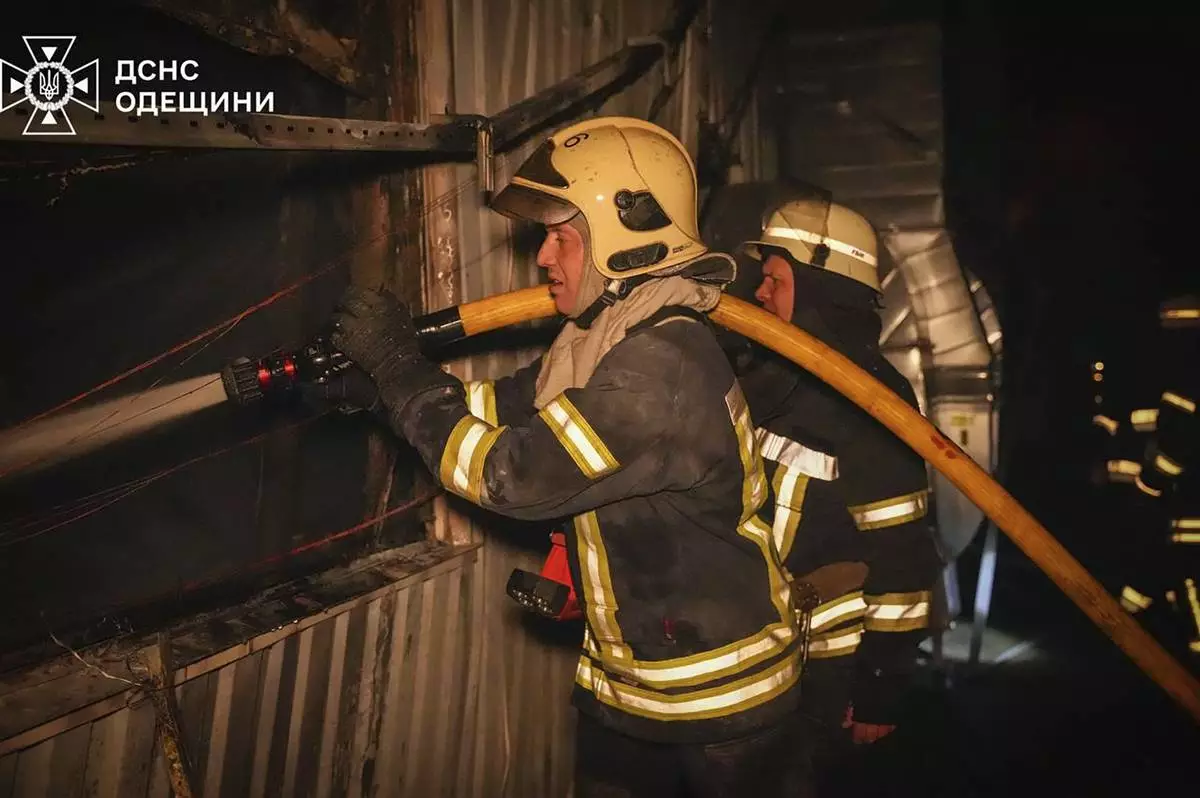
In this photo provided by the Ukrainian Emergency Service, emergency services personnel work to extinguish a fire following a Russian attack in Odesa, Ukraine, Wednesday, May 1, 2024. (Ukrainian Emergency Service via AP)
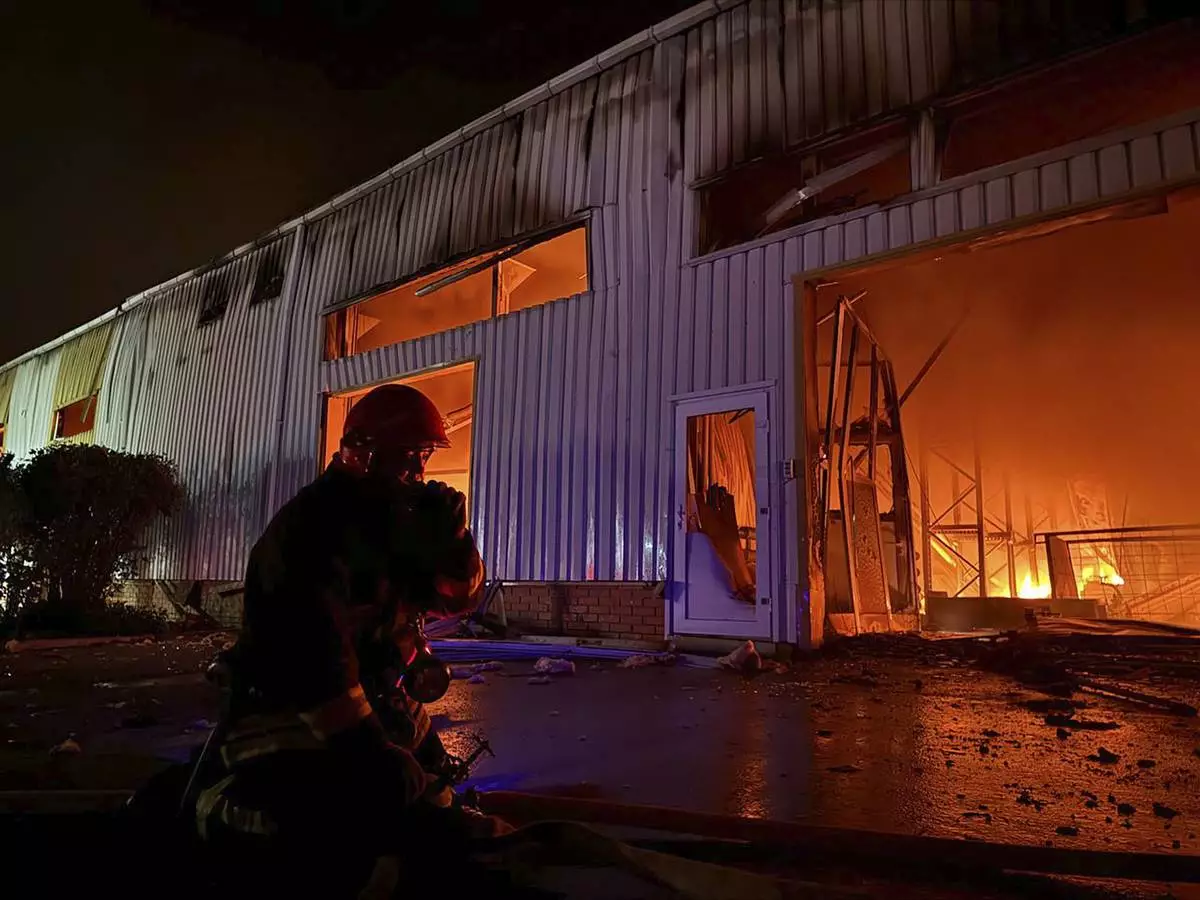
In this photo provided by the Ukrainian Emergency Service, emergency service personnel try to extinguish a fire following a Russian attack in Odesa, Ukraine, Wednesday, May 1, 2024. (Ukrainian Emergency Service via AP)
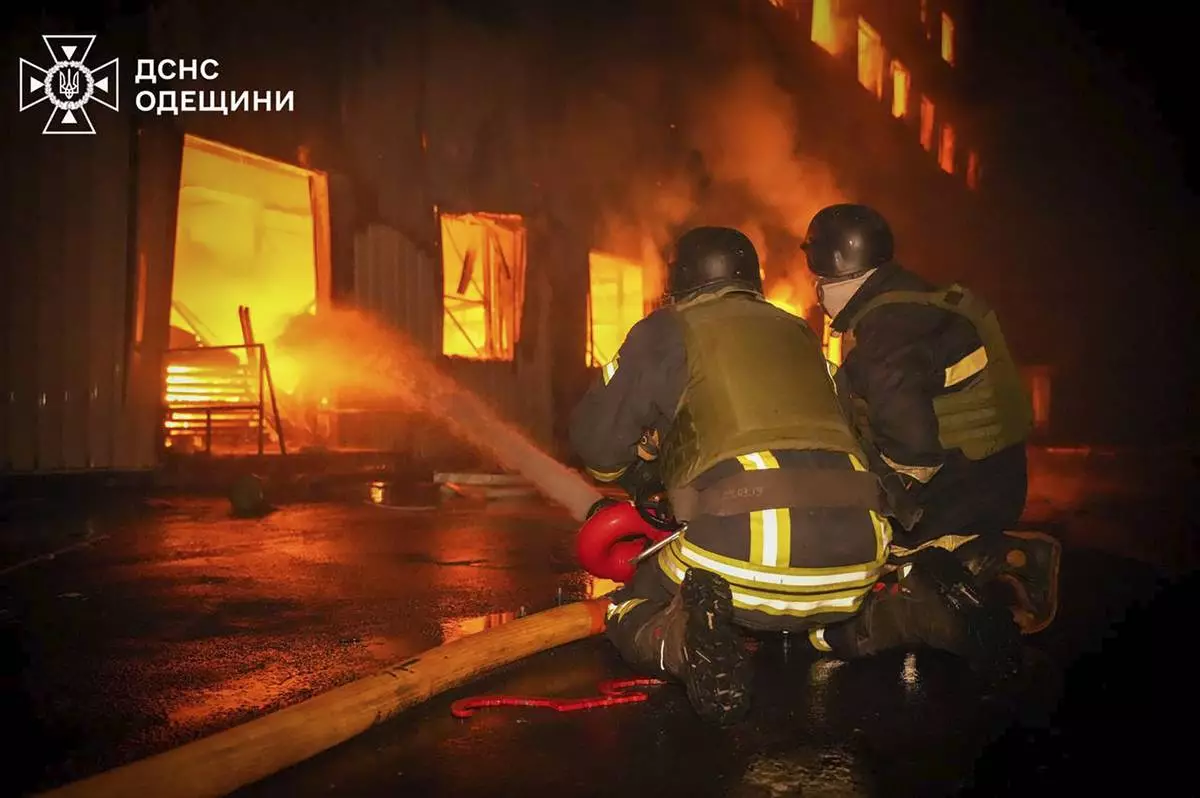
In this photo provided by the Ukrainian Emergency Service, emergency services personnel work to extinguish a fire following a Russian attack in Odesa, Ukraine, Wednesday, May 1, 2024. (Ukrainian Emergency Service via AP)
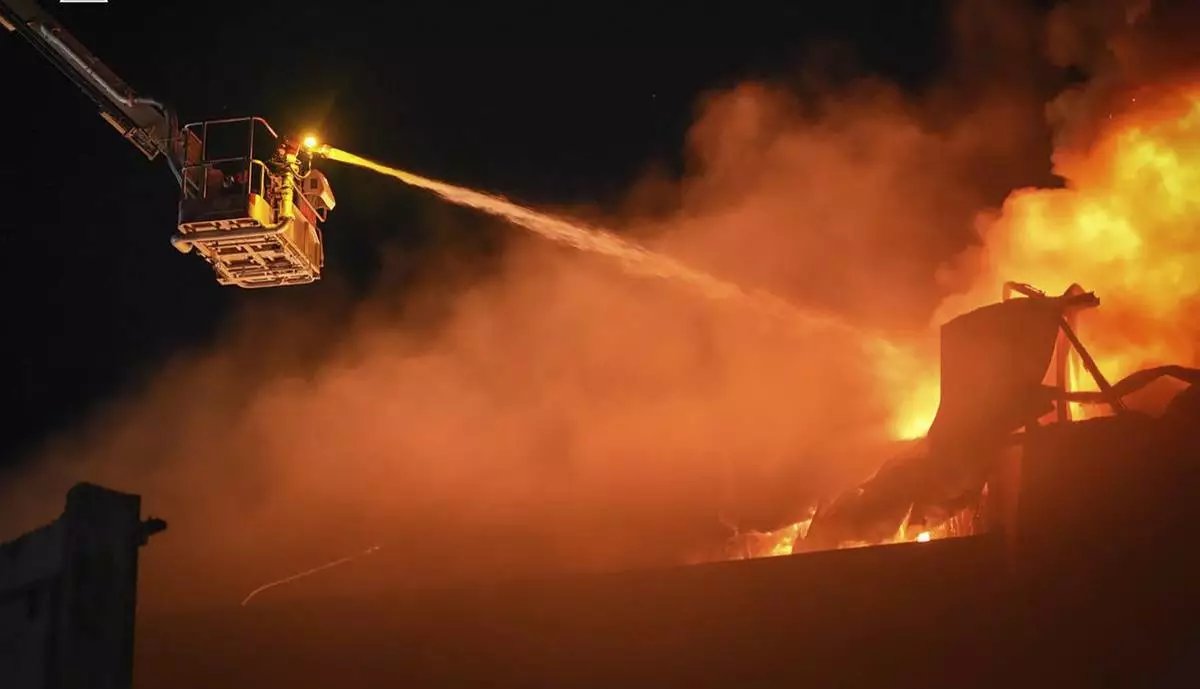
In this photo provided by the Ukrainian Emergency Service, emergency services personnel work to extinguish a fire following a Russian attack in Odesa, Ukraine, Wednesday, May 1, 2024. (Ukrainian Emergency Service via AP)










